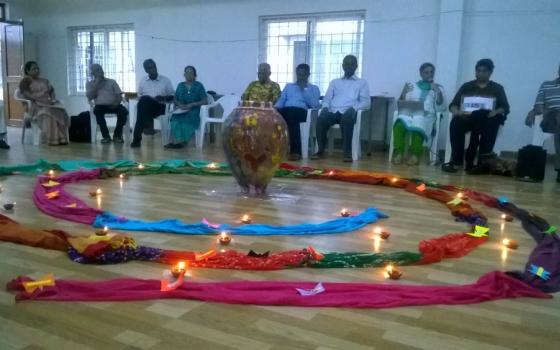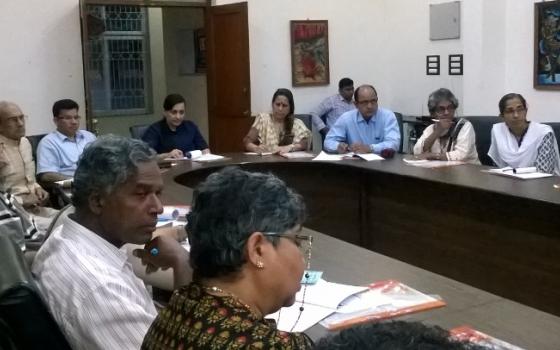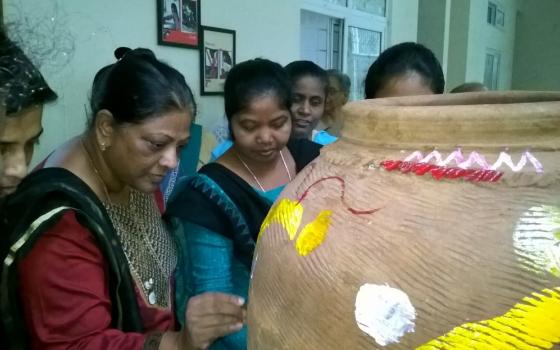In late September, I joined 48 other women and men from across India who had gathered together for a consultation on the impact of religion and culture on the empowerment of women. This consultation was jointly organized by Streevani and Montfort Social Institute to bring fresh thinking to the formation of a new learning. The participants were activists who particularly believe than an egalitarian society is possible.
It was a time of deliberating, conceptualizing, determining and searching for the very essence of religion. The debate was about the impact of religion and culture on the empowerment of women. As the deliberations began, we thought it was important to understand what religion means and to recognize the interplay between religion and culture on the life of people of different faiths.
Whatever our religion and how we worship, there is an urgent need to define the meaning and expression of religion and spirituality. Religion is an expression of what we profess, and we use different symbols and metaphors to do so. We need to understand the place of religion in the social imagination. We as human beings always look for symbols to give expression to our beliefs, and there is a great emphasis on rituals. Women in particular in India are the ones who sacredly carry out all the rituals. Many believe that if they do not fulfill these rituals, they will be hit by some adversity.
The four speakers who talked about the dominant religions brought out the fact that the practice of them is very patriarchal. Whether we look at religion from the lens of Hinduism, Islam or Christianity, they have been male-dominated — the dialogue between the holy and profane has always been determined by men.
We need to preserve the voice of dissent, especially of women in religion. All the religions have always excluded women when it comes to worship. The males have monopolized worship, proscribing that offerings can be made only by men. We have been taught that women are impure because of their biological menstruation cycle. Then she is considered defiled and thus cannot enter the holy of holies (Jewish tabernacle), cannot perform puja (Hindu offering), cannot lead the namaz (salat, or Islamic prayer). This is perhaps where the voice of dissent needs to be raised. Isn't this questioning the creation of women and her physique and anatomy? How can blood, which is the very ingredient that keeps one alive, become impure?
Most of us women have internalized and accepted this belief. Religion sets the norms, and culture sanctions them. In some families during the time of menstruation, the woman has to be kept outside in a separate room; she cannot enter the kitchen, and her food is given to her outside. It is very embarrassing — the entire family and neighborhood come to know of it. This custom has been religiously handed down, mostly by women.
Another important factor is about sharing of power. If power is shared equally, then there is no room for control. Down through the ages, men have controlled our economy and our politics and have ensured that social sanction is maintained. Religion and culture emphasizes these belief systems. How can one half of humanity be denied something that is supposed to bring us closer to the Divine, to the plan of God?
Due to overemphasis on dogmas, women have lost their space in the running of society. Women have been strategically left out of decision-making processes because we have stereotyped the roles of women and men. It is urgent that women organize themselves and create awareness about raising their voices against anything that is unjust — anything that denies them a place either in the home, workplace or other institutions. We have to reclaim this space, move towards being inclusive in our practice.
During the consultation, we looked at Scripture and found in the book of Genesis 1:27 that "God created man and woman to his own image and likeness." Therefore, both are created as equals; there is no superiority or power over. There is no discrimination and this idea is reinforced in the letter to the Galatians; there is no Jew or Greek, no male or female — we are all one in Jesus.
Most religious scripture subscribes to equality, yet in all the dominant religions, inequality is promoted and practiced. This sense of inequality has been experienced by women down the ages. It is manmade and therefore needs to be undone to usher in a new order in our world, in order to safeguard the rights of the girl child, in order to work towards an experience that no one is less because she/ he belongs to the other gender.
During our reflection, it became quite clear to us that due to many social practices women have been denied education in the past, especially in the east. In the early ages of Hinduism, there were many educated women. Later this was seen as a threat to the men, so a religious sanction was included in the Sanskrit laws of Manu-smriti that women should not enter the social spectrum and should be domesticated.
Knowledge is power and gives one an identity to enter into public space and voice what one sees, experiences, understands, perceives; it influences your perception of life. There is an urgency that more women begin to study theology and critique our practices and traditions that continue to subjugate us.
What emerged for us at the consultation as imperative is to reclaim the Jesus movement: going back to re-reading the Scriptures to be inspired by Jesus and how he was with people while he walked this Earth. Jesus, Prophet Muhammad or Lord Rama never started an institutionalized religion; all of them came to offer us a way of life, to give us a God experience that cannot be expressed in words. This God experience is the essence of religion. Perhaps it is also our wakeup call.
[Dorothy Fernandes a Sister of the Presentation of the Blessed Virgin Mary from India. She presently serves as Vice Provincial of the Indian province while continuing to be deeply engaged with the urban poor of Patna, Bihar.]
Related column from a theologian who was there, Virginia Saldanha - The power of religion over women in India



